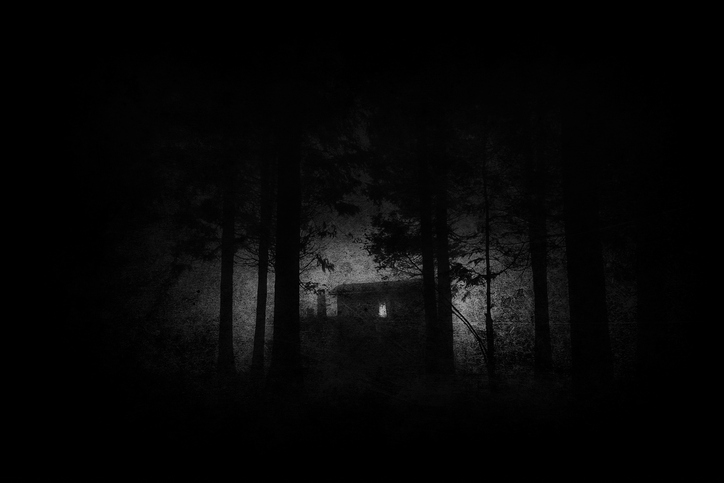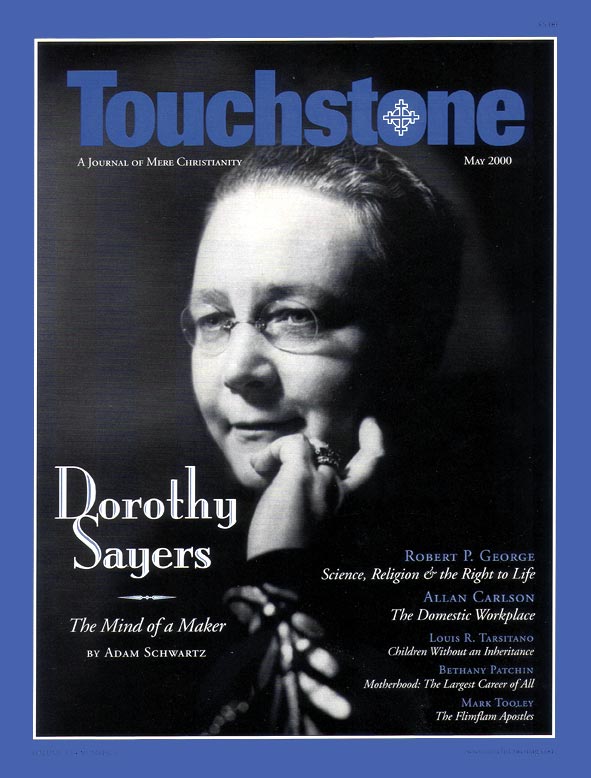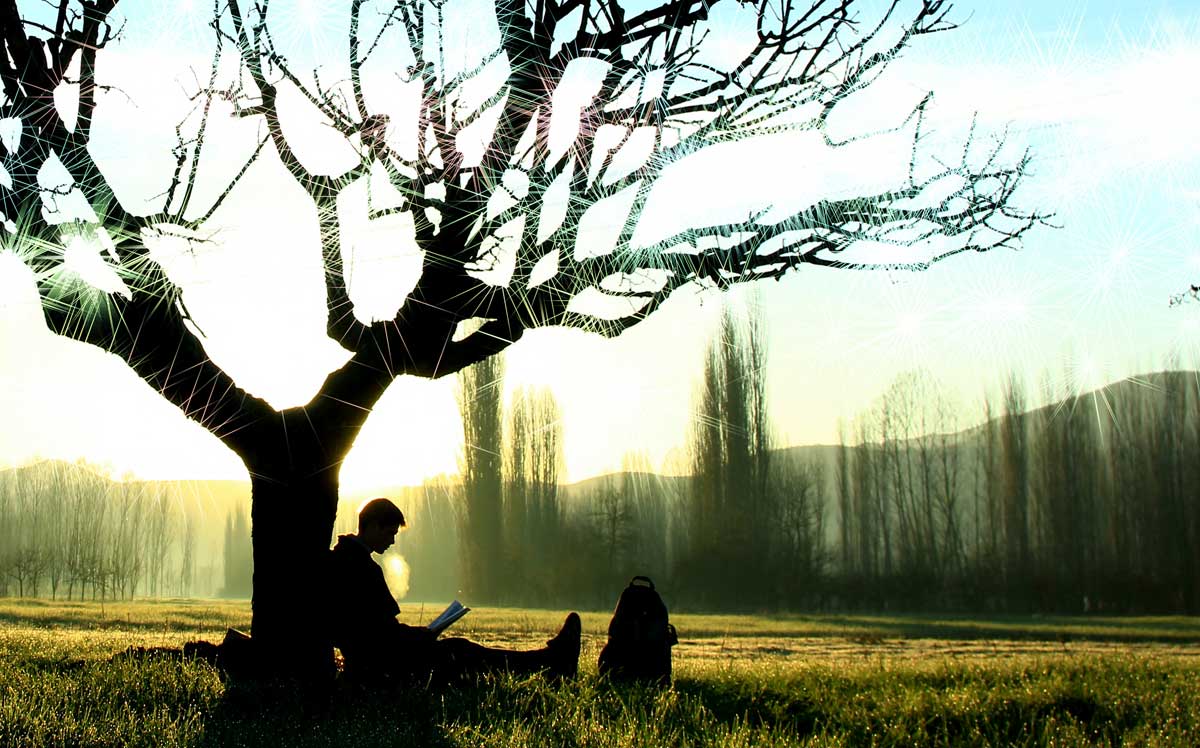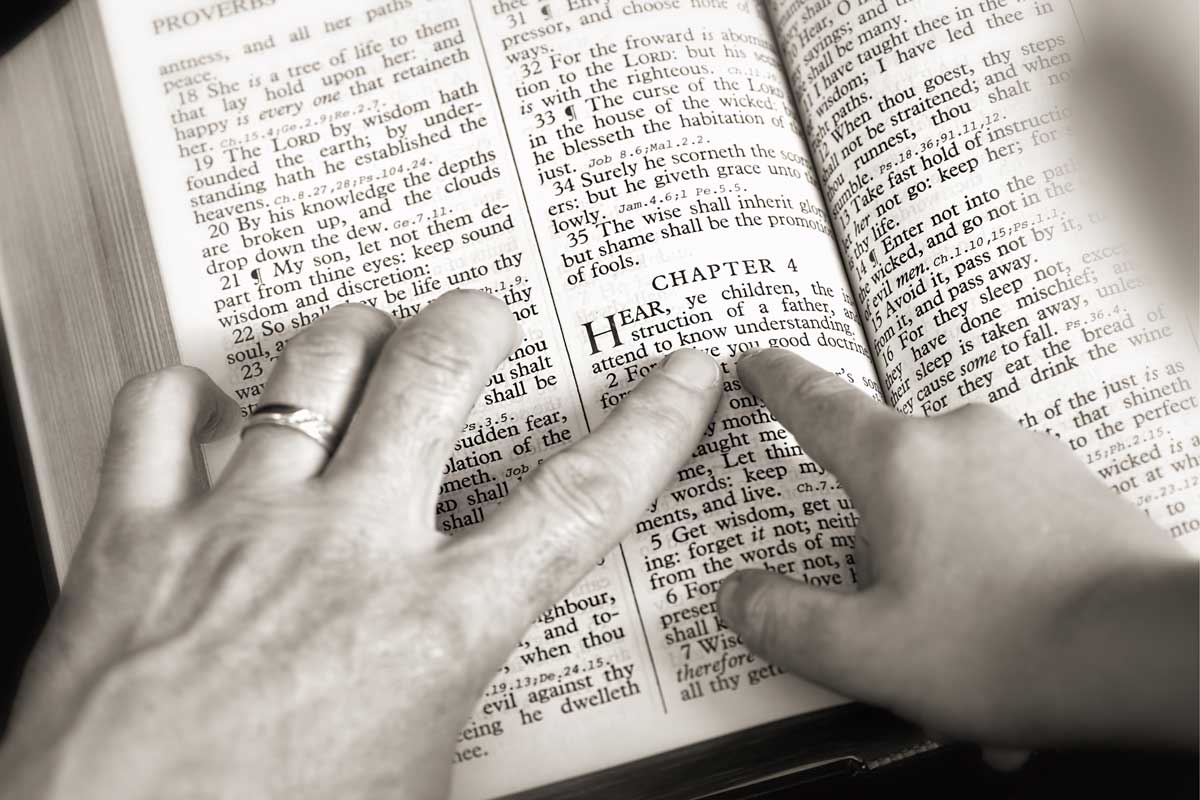A Student’s Garden of Terrors
David M. Whalen on Fearing Rightly
I live in a world of fears, terrors, tremors, and even midnight screams. Any of you who have children know what I mean. G. K. Chesterton once remarked that a child’s world is naturally and properly laced with terror, and any attempt to purge a child’s world of its traces in song or story is both foolish and futile. Deprive a child of terror, and the child will invent it.
Some weeks ago, I was awakened by the sobbing scream of my daughter, calling out in the dark, half awakened by her own bad dream. This is an old drill. I staggered down the hall, calling softly, lest her cries awaken and terrify the multitude of children (all the more important as that night we had two additional children staying with us). “Kidnappers,” she sobbed.
She was having “bad thoughts”—for some reason, my children insist upon calling nightmares not nightmares but “bad thoughts”—about kidnappers coming into the house. I comforted her, gave her a drink of water, settled her down again, and returned to bed. I had fallen asleep again when the moan of terror was renewed. “Kidnappers! Kidnappers coming!” Up again, down the hall in a hurry, over to the bed, new words of comfort, assurances, suggestions of other thoughts to think. She had no need to fear, I said.
Between three and four o’clock that morning, four times did she awaken in fear. “Daddy,” she moaned the last time, “Daddy, I’m scared.” A pitiful cry, certainly, though I suspect those of you who have had similar experiences will find your pity includes more than the child alone. My pity, alas, had evaporated. No staggering quietly down the hall, but storming now.
With more passion than patience I exploded. “Angela! There are no kidnappers here! No kidnapper would dare enter this house.” I was in the grip of the muse now, speaking pure inspiration. “There are ten children here! Kidnappers are afraid of you! Do you know what would happen to a kidnapper? Do you think he would live? Do you think for a moment that any kidnapper is equal to the riot of pigmy chaos you would unleash on him?”
As I yelled at my daughter at four o’clock in the morning, she slowly began . . . to grin. She was smiling. She began to see it. Her fear was utterly misplaced. It does no good to say, “You have no reason to be afraid,” for fear belongs in the universe as much as does hydrogen. But this fear was misplaced. Fear belonged in the coward heart of the kidnapper faced with a household in which the only predictable thing is unpredictability. Heaven help the lunatic who thought he could capture a child that night! She went contentedly back to sleep, and I, thanking the muse, returned to salvage what I could of repose and the night.
Intellectual Fears
The child is the father of the man. What of the misplaced fears of the intellectual world people like me inhabit?
In the main, academics have a deadly fear of ends, so we become obsessive about means. That is, we love method, but we are frightened by both the objects and the ends that our methodologies are meant to serve. The reason for this is a profound and paradoxical fear of the very idea of knowledge itself. Having found the knowledge of so many people for so many ages to be illusory, academics tend to hide in a reductive skepticism, masquerading as sophistication.
Even those whose disciplines are blessed with material things as their objects of study all too often flee serious reflection on their own ultimate ends and the questions of their meaning and significance. For virtually all disciplines, unremitting immersion in procedures, techniques, and methods has become the objective of education itself, immune to questioning or critique, largely because this immersion can act as a readily managed distraction from the terrible questions of ultimate ends.
Fleeing from the ends, intellectuals often pay more attention to appearances than to realities. Thus, for instance, they tend to dread the appearance of ignorance, even more than ignorance itself. This is one reason (and not merely the magnitude of the learning one must master) for the ever-narrowing specialization in academia. We hate to be caught with our intellects around our ankles, so to speak, so we wall in our professional boundaries and man the barricades for dear life.
Like doctors who make bad patients, we often make bad students as well. While we hate the appearance of ignorance, we also dread being caught in the act of learning something. Of course we love to learn, but we prefer to do it when no one is looking. This way, the extent of what we don’t know will not be so painfully apparent—ideally, not even to ourselves—and thus the appearance of ignorance is avoided yet again.
Finally, veritably paralyzed by misplaced fears of ends and the appearance of ignorance, scholars frequently talk the talk of free and open exchange, but in fact, the conventions of academic terror render us a pretty tame bunch. As long as our debate is merely, as they say, academic, we’re fine. We love to play mental games with our disciplines, but it’s almost embarrassingly bad form to be serious. If a debate strays into something meaningful, we are likely to become either bemused or angry.
Kidnapped Students
I have been brutal with my own profession, so I trust I am allowed a cursory and mild mention of two of the misplaced fears that typically afflict students. The first such is the fear of academic irrelevance. Students frequently find themselves bound and gagged by the dread that their studies will not equip them for their professional lives, that their pursuits are irrelevant to the works and days that lie ahead. This fear abides even among majors most avowedly professional or career-oriented. But the fear is misplaced.
It may sound paradoxical or quaint, but in fact irrelevance, of a certain sort, is the pride of higher education. By addressing the highest rational faculties of man, liberal education—especially liberal education—aims beyond training homo faber or, one might say, “man-as-wage-earner,” to equip students for their very humanity. To pursue relevance in liberal education is like having children to obtain a tax deduction—you can do it, but it is a funny way to save money.
The best thing about biochemistry is not learning the mere procedural facility with, say, acid-base titration, but entering into one’s own nature and pondering the implications of our material beings. The glory of economics has little to do with understanding multipliers or even scarcity, however useful these may be, but rather what it means to be one who, in concert with his kind, moves among the myriad contingencies of material conditions and decisions.
The irrelevance students fear, irrelevance in the immediate and practical, is, frankly, inevitable. Pursue a higher education dedicated to getting ahead, and you will fail. It has never, in fact, worked. The delicious irony is that nothing is so impractical as practicality in higher education.
Fears propel students to pursue it, but the result, as you may see in ten or twenty years, will be a kind of ghastly slapstick, where Larry, Moe, and Curly, frantically occupied with the pursuit of some practical end, accomplish little but their own agony in their fits of misdirected effort. Blessed be those pragmatists for whom some gratuitous Groucho comes to outjest them then in their heart-struck injuries. But in the meantime, for those in pursuit of a liberal education, relevance of a different sort, thankfully, is the purchase and pride of it.
The second fear, students will insist, is a flesh-and-blood kidnapper. Contemporary students fear bad grades, apparently having forgotten what a grade signifies. Designed only to measure the progress and extent of one’s education, grades are a coda or footnote to the pursuit of knowledge and wisdom, but the coda has swamped the symphony, the footnote has obliterated the text.
In many students’ priorities, the measure has supplanted or usurped in value that which is measured. This is understandable, I admit. Whenever we attempt to measure things, a subtle shift occurs in our imagination, allowing the black hole of measurement to absorb more and more of our attention and effort. But do not misunderstand. I hardly suggest we ignore grades or recline upon a pseudo-philosophical nonchalance about effort and performance.
Misplaced here is fear of failing, or fear of the measure, rather than of the missed opportunity to learn. Redirect effort to the subject, discipline, or body of studies, letting the grade take care of itself. Easy for me to say, you say. Yet just a few weeks ago, a parent, a supporter of the college and member of the President’s Club, told me with palpable pride of his daughter who had taken a class here that changed everything for her, and became her favorite class.
She did not mind in the least, he boasted, the grade of “C.” He knew what this meant. He understood that this indicated an awakening love and understanding in her that made him more proud than any “A” could have.
Needful Fear
Such are the misplaced fears of the academic world. The very idea of misplaced fear implies the possibility of fear properly placed. There are, after all, genuine kidnappers who can make off with you. My final note concerns a fear that is needful, though largely missing in our intellectual world—a kidnapper with whom we ought to go, who will take us to the place we ought to be.
We have labored, for several hundred years, within severely blinkered notions of knowledge or learning. If I may crudely generalize, we tend to think of what we do in higher education as acquiring a mastery of something. Whatever the object of education—critical thinking habits, learning how to learn, cultural transmission, truth, wisdom, even, in many ways, career preparation—we try to master it. Even the very best students think of themselves as rigorously hunting down the matter, killing it, and ingesting it. Or, to change the figure, as masters of what we learn, our learning is our slave, suitably tamed, controlled, and shackled. It is ours.
Knowledge is power, and our souls are the whips. Now, certainly, much mastery—the real ability to wield and maneuver bodies of data or skills the way a general wields an army—is necessary in higher learning. But, frankly, this is the most pedestrian quality of education. Our misconception of learning itself as mastery is a convenient screen behind which we hide from a properly fearful reality: When learning is genuine, we do not master it. It masters us.
Like oracles in the grip of a god, we are hardly our own masters when we learn something, really see or know something. Truly to see something is to see also its merely partial comprehension by the intellect, its implication of things surprising yet intuited, its terrible or wonderful mystery. But such things sound like obfuscatory romanticism in an era busily hiding from the reality of a laudable, needful fear.
Do not, if you are a student, fear bad grades, or, if you are a teacher or scholar, fear the scorn and derision of the professional intellectual. Do not fear irrelevance, or the appearance of ignorance, or being seen to be serious. Fear learning, but with that kind of fear that one intuitively senses in things immensely consequential, things that master us with evocations of the mysterious and the obligatory and the participatory, things like love, like fecundity and life, like death, like beauty, like suffering, like wisdom.
Do not shield yourself from this laudable fear behind the screen of knowledge-as-mastery, or the sophisticated cynicism of the professional omniscient, or, perhaps worst of all, sentimentalized education (that is, education as self-amusement). Remain properly susceptible to forms of learning and kinds of knowledge for which this fear is, in fact, a precondition.
Like it or not, serious knowledge requires this fear as an epistemological necessity. You will know nothing truly important without it. Where the fear is lacking, so is understanding, and what is left, whether it is called knowledge, critical thinking skill, whatever, is nominal at best. Those T-shirts boasting “No Fear” may as well boast “No Learning,” or perhaps “Frivolous Is Us.”
And a Fruitful Fear
I think we could survive a few illusory kidnappers, as long as we have also a proper fear for the serious things in this world. But give in to the fear of kidnappers and thereby extinguish the fruitful fear of serious things, the fear that compels rather than repels, and you will lose the ability to detect the serious at all. Retain that fear, inhabit it, and you may make a momentous pilgrimage—a pilgrimage that does not end even when mastery of data or skills meets its inevitable limit.
A poet, Arvid Schulenberger, alludes to just this pilgrimage, and hints at its relation to laudable fear, in the following brief verse entitled simply, “One for You”:
You want a poem that you can remember?
My God, don’t you have enough stuff to remember?
What you need is a poem that you can’t remember,
In a moment of silence that you can’t forget.
In the laudable fear of serious things, we come full circle to a most serious and consequential fear indeed, a fear made visible in our families. I began with my daughter’s fears. One of our world’s greatest misplacings of fear has to do precisely with children. My chief notoriety among my peers is being the father of eight. People are generally astonished by, and even afraid of, what is in fact a natural desire of life itself. In our world, people describe their fear of having children as a fear of their ecological effects, or a fear of not being able to provide well for the children they have, or even a fear of failing to realize their own career potential.
These are modest claims, I think—falsely modest. Few people act on fears as banal as these. Like the academic fear of ends or truth, a deeper fear appears to motivate our flight from children: fear of the elemental, the immediate, and fear of the compelling realities children both represent and are, such as the reality of involuntary love, of unyielding commitment, the reality of being, the radical contingency of our lives.
These are things to be feared, what used to be called “awe-full” realities, and we do well to fear them. Whether we do well to avoid the signs and real presences of these realities incarnate is another matter.
subscription options
Order
Print/Online Subscription

Get six issues (one year) of Touchstone PLUS full online access including pdf downloads for only $39.95. That's only $3.34 per month!
Order
Online Only
Subscription

Get a one-year full-access subscription to the Touchstone online archives for only $19.95. That's only $1.66 per month!
bulk subscriptions
Order Touchstone subscriptions in bulk and save $10 per sub! Each subscription includes 6 issues of Touchstone plus full online access to touchstonemag.com—including archives, videos, and pdf downloads of recent issues for only $29.95 each! Great for churches or study groups.
Transactions will be processed on a secure server.
more on Education from the online archives
more from the online archives
calling all readers
Please Donate
"There are magazines worth reading but few worth saving . . . Touchstone is just such a magazine."
—Alice von Hildebrand
"Here we do not concede one square millimeter of territory to falsehood, folly, contemporary sentimentality, or fashion. We speak the truth, and let God be our judge. . . . Touchstone is the one committedly Christian conservative journal."
—Anthony Esolen, Touchstone senior editor













